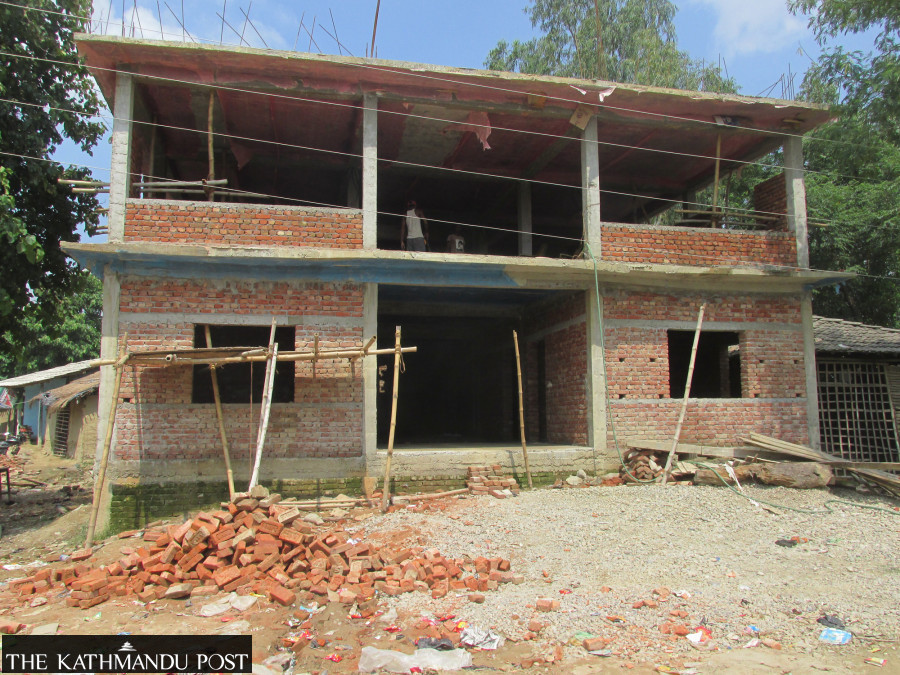National
Their five-year terms are ending but most local units still don’t own office buildings
Federal officials blame lack of funds and unresolved issues at the local level.
Prithvi Man Shrestha
Most of the elected local representatives will see their terms end without their local units having their own administrative buildings. Their terms are expiring in a few months with the Election Commision already recommending the date for holding new local elections for April 27.
There are 753 local units in the country, but just around 300 have their own administrative buildings,” said Bishnu Dutta Gautam, joint secretary at the Ministry of Federal Affairs and General Administration.
According to him, administrative buildings for about 300 local units are under construction but the remaining will have to make do with the current arrangements. “There are issues including unavailability of land and dispute over the location of the local unit headquarters,” Gautam said. “As a result, the wish of many elected representatives to have their own office buildings before their tenure ends, is unlikely to be fulfilled.”
An assessment of the Ministry of Federal Affairs and General Administration showed 535 local units out of the 753, need new administrative buildings.
Until the last fiscal year, construction of new administrative buildings for 30 local governments had been completed while buildings for 40 to 50 local units were in the final phases of completion.
The need for new administrative buildings was felt as the size of the local governments grew after the country embraced a federal system of governance.
“One of the main reasons for the slow progress in the construction of new administrative buildings is the failure of the central government to provide promised funds,” said Gautam.
As per the Working Procedures on Local Level Administrative Building Infrastructure Development Programme endorsed by the Cabinet in December 2019, the central government will bear up to 60 percent of the cost of office buildings of rural municipalities, and up to 50 percent and 40 percent in case of municipalities and sub-metropolitan cities, respectively.
As the metropolitan cities didn’t demand funds from the centre, no cost-sharing mechanism has been set up, according to the ministry.
In the case of rural municipalities, the central government bears 60 percent of the construction cost if the total cost does not exceed Rs90 million. And for municipalities, the centre bears 50 percent of the cost, if the total construction cost is up to Rs 120 million. If the construction costs exceed these limits, the local units themselves will have to bear the additional cost, according to the ministry.
According to Gautam, the federal government will pay an estimated Rs30 billion under the cost-sharing mechanism for the completion of about 300 local unit buildings.
But, the federal government has been allocating less than Rs1 billion each year to fund these constructions. In the current fiscal year, the Finance Ministry has allocated Rs800 million to fund such constructions. In the last fiscal year also, around Rs800 million has been allocated for administrative buildings construction at the local level, but the government later provided an additional Rs44.63 million to 45 local governments for the purpose.
Krishna Bahadur Katwal, senior divisional engineer at the Department of Local Infrastructure, which coordinates Kathmandu's support to local governments, said the federal government needs to provide Rs60 million on average to each local unit for the construction of administrative buildings under the existing cost-sharing mechanism. “Although the centre needs to provide Rs6 billion for constructing 100 administrative buildings, less than Rs1 billion has been allocated for the purpose in this year,” he said.
The Federal Affairs Ministry is preparing to distribute the available budget among 160 local units to fund the constructions. We have to distribute around Rs3 billion to them, but we can’t do so in lack of budget,” said Gautam. “We will try to arrange more funds for the purpose by asking the Finance Ministry in April.”




 10.12°C Kathmandu
10.12°C Kathmandu














